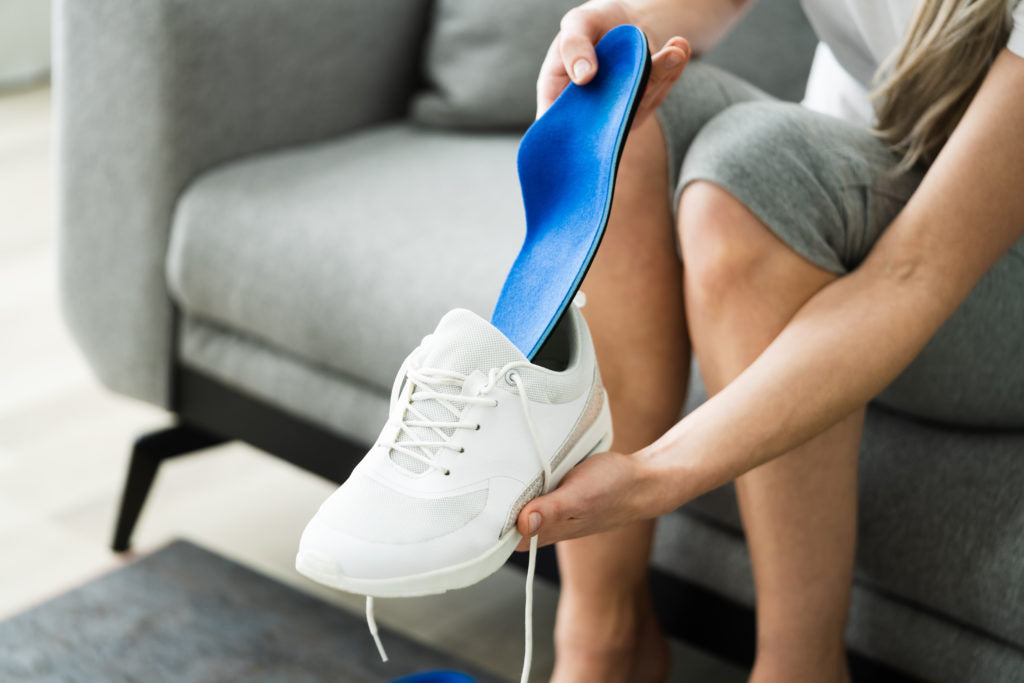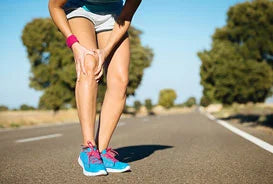
Lower back pain is a very common condition seen in doctors’ offices. Back pain can present itself in different ways depending on the cause and type of pain. It can include muscle pains and aches, shooting pains, reduced ability to move, and pains that spread down to the legs. Simply put, if you feel a dull ache or pain in your lumbar region following daily activities, you may have lower back pain.
Lower back pain is one of the most common pain problems in the US today and you may experience it at some point in your lifetime. For some, it can be a recurrent, chronic problem. And for many lower back pain sufferers, it’s an obstacle that keeps you from being your best. What might surprise you is that lower back pain may be caused by being on your feet for long periods of time.
If you are experiencing pain in your lower back and you don’t remember doing anything to injure it, the source of your pain could start with your feet. For example, if you’ve been experiencing foot pain for a while, it could be causing problems in your knees, hips, ankles, and back.
When foot pains or deformities cause you to walk differently, it has an impact on a variety of other joints within your body. Changing the way that you walk changes the mechanics of your ankle joint, which can eventually lead to ankle pain. This new gait can also affect your knees, hips, and finally, the lower back.
If you walk or run without properly supported feet, you may be stressing and straining your lower back. With every step, impact can travel up your legs to your lumbar region where muscles supporting the back can get aggravated, causing you pain.

Lower back pain can also be due to:
• Structural issues in the lower back including disc degeneration, disc alignment issues or nerve impingement.
• Being on your feet for long periods of time
• Being overweight
• Slouching (in chairs or while standing)
• Quick and straining movements (like lifting too-heavy objects)
• Wearing improperly cushioned shoes
HOW TO HELP PREVENT LOWER BACK PAIN?
Here are home remedies and steps you can take to help prevent lower back pain:
• Use insoles or inserts that provide a combination of shock absorption, cushioning and support for your feet. Dr. Scholl’s Orthotics for Lower Back Pain are clinically proven to relieve lower back pain all day
• Staying at a healthy weight can also prevent back pain, since excess weight can strain your muscles and joints. You can also prevent back pain by practicing good posture and lifting techniques.
• Wear shoes that fit properly and provide adequate support
• Strengthen your back, leg and stomach muscles. Your abdominal muscles do a great deal of work to help support the back and when weak they can increase your chance of experiencing lower back pain. By building muscle strength and flexibility through core-strengthening exercises, you can condition these muscles to work together in a beneficial way. Improving the flexibility of your upper legs and hips can also help with your alignment and help to reduce lower back pain.
• Exercising regularly is the most effective way to prevent lower back pain. Aerobic exercises and specific muscle strengthening and stretching exercises can help. Low-impact activities like swimming, walking, and bicycling can increase overall fitness without straining the lower back.
HOW TO RELIEVE LOWER BACK PAIN?
Lower back pain treatments depends on the exact cause of the lower back pain. For some, lower back pain relief may only come with medical attention — especially if the pain won’t go away. For many, however, there are some things that you can do at home to feel better.
Taking over-the-counter pain relievers, and applying ice or heat are often all that is needed to relieve lower back pain. It is generally recommended that you continue with your regular activities as much as possible to promote recovery from your sore lower back. You should try to continue with light daily living activities and walking as is comfortable. However, it is best that you do avoid activities that can stress your back and make your back pain worse.
If you do not start to recover from your general back pain after 2 weeks, you should book an appointment with your doctor. If you are finding that your general back pain is causing bowel or bladder problems, is following a fall or injury, or is accompanied by a fever, you should seek immediate medical care. You should contact your doctor if your general back pain is severe and not improving with rest, spreading down your legs, resulting in weakness or unusual sensations in your legs, or is accompanied by unexpected weight loss. If you have a history of steroid, drug or alcohol use, or are over the age of 50 and experiencing general back pain for the first time, you should also contact your doctor.
How to relieve lower back pain
It’s important to see a doctor for an evaluation and guidance on how to treat lower back pain. However, recent NIH survey data indicates that approximately 80% of lower back pain can be attributed to pain caused through daily activities called “mechanical issues”. There are a number of lifestyle changes and over-the-counter treatments that can help to alleviate lower back pain including:
Regular activity – People with back pain often shy away from physical activity not realizing that exercise can actually help with both pain and range of motion. A physical therapist can recommend an exercise plan to reduce pain while minimizing stress on the back. Low impact sports like cycling, walking and swimming can be especially beneficial for lower back pain.
Weight loss – If you’re overweight, it can be helpful to drop some pounds as this can help lessen the pressure on the lower back. Even a small amount of weight loss can help lower back pain.
Orthotics and Insoles – Wearing good supportive shoes along with orthotics or insoles can help improve alignment and absorb shock, helping to reduce lower back pain.
Cold and heat therapy – Using ice, a heating pad, or a combination of the two can help to ease lower back pain.
OTC NSAIDs – Over-the-counter non-steroidal anti-inflammatory drugs such as ibuprofen (Advil, Motrin) and naproxen (Aleve) may be recommended by your healthcare provider in order to reduce pain and swelling.
Topical rubs – Products containing ingredients like lidocaine, salicylates, capsaicin, menthol, and diclofenac sodium (Voltaren) can provide immediate relief when applied directly to the lower back area.
It can take a lot of time and effort to get rid of lower back pain. If you don’t get relief after trying these methods, ask your doctor what to do for lower back pain. In cases of more severe lower back pain, your doctor may prescribe or recommend stronger medications and treatments.
How to sleep with lower back pain
If you have lower back pain, it may be easier on the back to sleep either on your side or face-up. To relieve lower back pain while sleeping, you can try putting a pillow between your knees if you sleep on your side or under your knees if you sleep face-up. This can help reduce pressure on the lower back. You can also try putting a small pillow or a towel under your lower back when sleeping face-up.
Is lower back pain a sign of pregnancy?
Lower back pain is not a sign of pregnancy. It is the result of added weight bearing during pregnancy causing overpronation that can lead to experiencing lower back pain. This is contrary to prior thought where low back pain during pregnancy was caused by Lordosis, or an over backward leaning of the body to balance the weight of the developing child.
It’s possible for lower back pain to be a sign of pregnancy. Most commonly, lower back pain develops later in the pregnancy, starting at month five. However, the pain can begin earlier, as early as eight weeks.
What can cause lower back pain in a women?
There are several potential causes of lower back pain that are specific to women. These include:
Pregnancy – During pregnancy a woman’s body goes through a number of changes. Weight gain along with hormonal and structural changes can increase the risk of lower back pain.
PMS – Premenstrual syndrome can cause a number of unpleasant symptoms including lower back pain.
Menstruation – Some women experience lower back pain during their periods.
What organs can cause lower back pain?
Health issues related to specific internal organs of the body can lead to lower back pain. These organs include the kidneys, uterus, colon and pancreas. Lower back pain may be caused by a number of issues related to specific organs, including inflammation and infection. If you have lower back pain that you suspect is linked to an issue with an internal organ, it’s important to see your healthcare provider in order to determine the underlying cause.
Can constipation cause lower back pain?
Yes, in some cases constipation can cause lower back pain. When stool backs up, it can create pressure which can lead to lower back pain.
Is walking good for lower back pain?
Yes, walking can help improve lower back pain. Low impact activities like walking can help reduce pain and stiffness in the lower back.
What is the best medicine for lower back pain?
There is no best medicine for lower back pain since what helps lower back pain in one individual might not be as effective for someone else. Before taking medication for lower back pain, it’s important to ask your healthcare provider for guidance.
There are non-steroidal anti-inflammatory drugs (NSAIDs) such as ibuprofen (Advil, Motrin) and naproxen (Aleve) that are available over-the-counter. Your healthcare provider may recommend these medications as a first step to address your lower back pain. There are also over-the-counter topical products that may be helpful for lower back pain. These products contain ingredients like salicylates, menthol, lidocaine, capsaicin and diclofenac sodium (Voltaren).
For pain that doesn’t respond to over-the-counter remedies, doctors may recommend stronger treatments such as prescription-strength pain killers and anti-inflammatory medications.
Can gas cause lower back pain?
Yes, gas can cause lower back pain in some cases. Excess gas can cause bloating and this can put pressure on the lower back, resulting in pain.
Additional Resources
• https://www.webmd.com/back-pain/features/manage-low-back-pain-home
• https://www.webmd.com/back-pain/sleep-tips-for-back-pain#:~:text=Try%20sleeping%20with%20a%20pillow,the%20small%20of%20your%20back">
• https://www.cedars-sinai.org/health-library/diseases-and-conditions/b/back-pain-during-pregnancy.html
• https://www.healthline.com/health/lower-back-pain-causes-female
• https://medlineplus.gov/periodpain.html
• https://www.healthline.com/health/womens-health/severe-lower-back-pain-during-period#:~:text=Lower%20back%20pain%20is%20a,more%20serious%20condition%20called%20endometriosis
• https://www.pennmedicine.org/updates/blogs/musculoskeletal-and-rheumatology/2017/november/back-pain-on-one-side
• https://www.healthline.com/health/lower-back-pain-and-constipation#lower-back-pain
• https://www.webmd.com/lung/news/20200508/doctors-update-warning-signs-of-severe-covid#1
• https://www.medicalnewstoday.com/articles/321833


